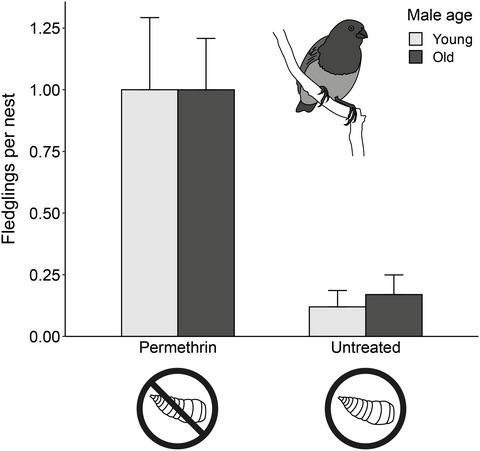Our official English website, www.x-mol.net, welcomes your
feedback! (Note: you will need to create a separate account there.)
Under adverse conditions, older small tree finch males ( Camarhynchus parvulus ) produce more offspring than younger males
Ethology ( IF 1.3 ) Pub Date : 2020-07-17 , DOI: 10.1111/eth.13069 Christian Wappl 1 , Arno Cimadom 1 , Nikolaus Filek 1 , Eileen Heyer 1 , Sabine Tebbich 1
Ethology ( IF 1.3 ) Pub Date : 2020-07-17 , DOI: 10.1111/eth.13069 Christian Wappl 1 , Arno Cimadom 1 , Nikolaus Filek 1 , Eileen Heyer 1 , Sabine Tebbich 1
Affiliation

|
Abstract Females of many bird species prefer mating with older males, presumably because they provide superior parental care and possibly superior genes. A previous study found that female small tree finches (Camarhynchus parvulus) preferred pairing with old males and had a higher breeding success when paired with old males because their nests were more concealed, higher up in the canopy and therefore less likely to be depredated. However, causes for brood loss have changed over the last decade: predation of small tree finch nests has decreased, whereas brood losses due to parasitism by the invasive parasitic fly Philornis downsi have increased. In the present study, we investigated (a) how the change in predation and parasitism by P. downsi influenced the breeding success of small tree finches, (b) whether there were still differences in breeding success between young and old males, (c) whether P. downsi infestation had a differential effect on nests of young and old males and (d) whether young and old males differed in foraging success. During 2012–2016, we found an overall low influence of predation and a high influence of P. downsi, but neither differed between nests of young and old males. Nests of old males had more fledglings than those of young males. However, the difference in breeding success disappeared when P. downsi numbers were experimentally reduced by injecting an insecticide into nests. This indicates that older males were able to compensate for the detrimental effects of parasitism.
中文翻译:

在不利条件下,年长的雄性小树雀(Camarhynchus parvulus)比年轻的雄性产生更多的后代
摘要 许多鸟类的雌性更喜欢与年长的雄性交配,大概是因为它们提供了更好的亲代照顾和可能更优越的基因。之前的一项研究发现,雌性小树雀(Camarhynchus parvulus)更喜欢与年老的雄性配对,并且与年老的雄性配对时繁殖成功率更高,因为它们的巢更加隐蔽,在树冠上更高,因此不太可能被掠夺。然而,在过去十年中,造成巢雀损失的原因发生了变化:对小树雀巢的捕食减少了,而由于入侵寄生蝇 Philornis downsi 的寄生而导致的巢雀损失增加了。在本研究中,我们调查了(a)唐氏雀的捕食和寄生变化如何影响小树雀的繁殖成功率,(b)年轻和年老雄性之间的繁殖成功率是否仍然存在差异,(c) P. downsi 侵扰是否对年轻和年老雄性的巢穴有不同的影响,以及 (d) 年轻和年老的雄性在觅食成功方面是否存在差异。 2012年至2016年期间,我们发现总体上捕食的影响较低,而P. downsi的影响较高,但年轻和年老雄性的巢穴之间没有差异。年老雄鸟的巢中比年轻雄鸟的巢中拥有更多的雏鸟。然而,当通过向巢中注射杀虫剂实验性地减少 P. downsi 数量时,繁殖成功率的差异就消失了。这表明老年雄性能够补偿寄生的有害影响。
更新日期:2020-07-17
中文翻译:

在不利条件下,年长的雄性小树雀(Camarhynchus parvulus)比年轻的雄性产生更多的后代
摘要 许多鸟类的雌性更喜欢与年长的雄性交配,大概是因为它们提供了更好的亲代照顾和可能更优越的基因。之前的一项研究发现,雌性小树雀(Camarhynchus parvulus)更喜欢与年老的雄性配对,并且与年老的雄性配对时繁殖成功率更高,因为它们的巢更加隐蔽,在树冠上更高,因此不太可能被掠夺。然而,在过去十年中,造成巢雀损失的原因发生了变化:对小树雀巢的捕食减少了,而由于入侵寄生蝇 Philornis downsi 的寄生而导致的巢雀损失增加了。在本研究中,我们调查了(a)唐氏雀的捕食和寄生变化如何影响小树雀的繁殖成功率,(b)年轻和年老雄性之间的繁殖成功率是否仍然存在差异,(c) P. downsi 侵扰是否对年轻和年老雄性的巢穴有不同的影响,以及 (d) 年轻和年老的雄性在觅食成功方面是否存在差异。 2012年至2016年期间,我们发现总体上捕食的影响较低,而P. downsi的影响较高,但年轻和年老雄性的巢穴之间没有差异。年老雄鸟的巢中比年轻雄鸟的巢中拥有更多的雏鸟。然而,当通过向巢中注射杀虫剂实验性地减少 P. downsi 数量时,繁殖成功率的差异就消失了。这表明老年雄性能够补偿寄生的有害影响。











































 京公网安备 11010802027423号
京公网安备 11010802027423号